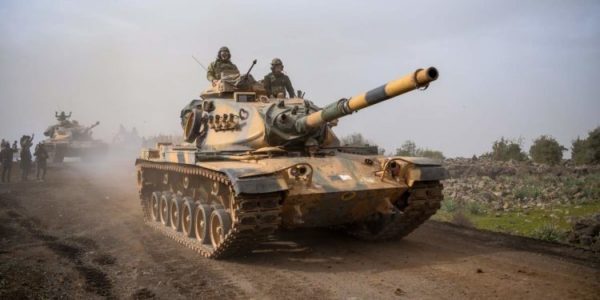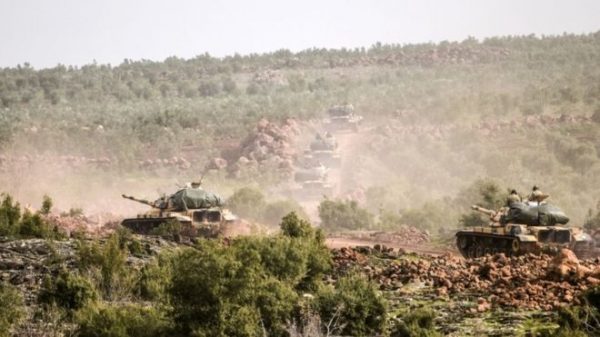
Turkey has killed at least 260 Syrian Kurdish fighters and Islamic State militants in its four-day-old offensive into the Kurdish-dominated Afrin region of northwest Syria, the Turkish military said on Tuesday.
U.S. President Donald Trump plans to raise concerns with Turkish President Tayyip Erdogan in a phone call expected on Wednesday about Ankara’s offensive against U.S.-backed Kurdish YPG forces in Afrin, a senior U.S. official said.
French President Emmanuel Macron also voiced disquiet, a few hours after Turkey’s foreign minister said it wanted to avoid any clash with U.S., Russian or Syrian government forces during its offensive but would do whatever necessary for its security.
The air and ground operation has opened a new front in Syria’s multi-sided civil war and could threaten U.S. plans to stabilize and rebuild a large area of northeast Syria – beyond President Bashar al-Assad’s control – where Washington helped a force dominated by the YPG to drive out Islamic State militants.
The United States and Russia both have military forces in Syria backing opposing sides and have called for restraint on the part of Ankara’s “Operation Olive Branch” to crush the YPG in the Afrin region near Turkey’s southern border.

A senior Trump administration official, who briefed reporters on condition of anonymity, said Ankara had sent “conflicting signals” about the scope of the offensive.
“We would urge them to limit the incursion as much as possible,” the official said, who said the phone call would happen soon. Another official – as well as Turkey’s foreign minister – said Erdogan and Trump planned to speak on Wednesday.
A statement by Macron’s office said: “Taking into account Turkey’s security imperatives, the president expressed to his Turkish counterpart his concerns following the military intervention launched on Saturday in Afrin.”
Erdogan told Macron on Tuesday Turkey was taking all measures to prevent civilian casualties in the Afrin operation, sources at the presidential palace said. The two leaders agreed to stay in close contact on the issue.
The Kremlin said President Vladimir Putin had also discussed Turkey’s military operation Erdogan by phone and that Syria’s territorial integrity and sovereignty had to be respected.
A Kremlin statement said both men stressed the importance of continuing their two countries’ joint work to try to find a peaceful resolution to Syria’s crisis. Russia has been Assad’s most powerful ally against rebels and militants in Syria.
Turkish Foreign Minister Mevlut Cavusoglu reiterated Ankara’s demand that Washington stop supporting the YPG.
Ankara has said the operation will be swift, but Erdogan’s spokesman signaled an open-ended cross-border campaign, saying it would end only when some 3.5 million Syrian refugees now living in Turkey could safely return home.
The United States hopes to use the YPG’s control in northern Syria to give it the diplomatic muscle it needs to revive U.N.-led talks in Geneva on a deal that would end Syria’s civil war.
NEAR BREAKING POINT
Ankara has been infuriated by the U.S. support for the YPG, which is one of several issues that have brought ties between Washington and its Muslim NATO ally close to breaking point.
“The future of our relations depends on the step the United States will take next,” Cavusoglu said.
Turkey’s military, the second largest in NATO, has conducted air strikes and artillery barrages against targets in Afrin, and its soldiers and allied Syrian rebels tried to thrust into the Kurdish-held district from west, north and eastern flanks.
With heavy cloud cover hindering air support in the last 24 hours, advances have been limited and Kurdish militia have retaken some territory. Turkish troops and the Syrian fighters have been trying to take the summit of Bursaya Hill, overlooking the eastern approach to Afrin town.
The Syrian Observatory for Human Rights, a Britain-based war monitor, said 23 civilians had been killed in Turkish shelling and air strikes, and thousands were fleeing the fighting.
However, Syrian government forces were preventing people from crossing government-held checkpoints to reach the Kurdish-held districts of nearby Aleppo city, it said.
YPG THREAT
U.S. Defense Secretary Jim Mattis said Turkey’s offensive distracted from efforts to defeat Islamic State. White House spokeswoman Sarah Sanders said the United States wanted to see Turkey “de-escalate,” which Trump would raise in the call with Erdogan.
Ankara says the jihadist group is largely finished in Syria and that the greater threat comes from the YPG, which it sees as an extension of a Kurdish group that has waged a decades-long separatist insurgency inside Turkey.
Erdogan has said Turkey aims to destroy YPG control not just in the Afrin enclave but also in the mainly Arab town of Manbij to the east. “Terrorists in Manbij are constantly firing provocation shots. If the United States doesn’t stop this, we will stop it,” Cavusoglu was reported as saying on Tuesday.
“Our goal is not to clash with Russians, the Syrian regime or the United States, it is to battle the terrorist organization,” broadcaster Haberturk quoted him as saying.
“We will not live with fear and threats,” Cavusoglu said.
He tweeted that a lieutenant had become the second Turkish soldier to be killed in the operation. The Observatory said 43 rebels fighting alongside the Turks had also been killed, as well as 38 on the Kurdish side.
Later on Tuesday Cavusoglu discussed the crisis with U.S. Secretary of State Rex Tillerson during a conference in Paris.
Erdogan’s spokesman, Ibrahim Kalin, said the military operations would continue until Syrian refugees in Turkey “return home safely and the separatist terror organization has been cleansed from the region”.
The Kurdish-led administration of northeastern Syria appealed for a mass mobilization in defense of Afrin. “We call on all our people to defend Afrin and its pride, and contribute in all the related activities,” it said, without elaborating.
A U.N. report, citing local sources, said about 5,000 people in the Afrin district had been displaced as of Monday but that some of the most vulnerable had been unable to flee. It said the United Nations was ready to provide aid to 50,000 in Afrin.
Row over German-made tanks
The German government is facing calls to halt arms exports to Turkey after reports emerged that German-made Leopard tanks were being used in an offensive against the Kurdish YPG.
Some German politicians have requested that any moves to approve a tank upgrade deal be halted.
The row comes just weeks after the two countries’ foreign ministers vowed to improve bilateral ties.
Relations between the two Nato members have soured dramatically in recent years.
Reports on Friday suggested Berlin was moving to approve a request from Turkey for German arms manufacturer Rheinmetall to upgrade its Leopard 2 tanks, to make them less vulnerable to explosives.
The tanks are thought to have been used by Turkey against the Islamic State (IS) group in Syria. However, defence experts have claimed in German media that recent images from Turkey’s “Operation Olive Branch” appear to show them being used against Kurdish groups.
Politicians from both the left and right have spoken out against the tank upgrade deal, and asked the government to clarify its position on the Turkish offensive in the Afrin region of northern Syria.
Norbert Röttgen, a member of Chancellor Angela Merkel’s Christian Democratic Union (CDU) party and chairman of the parliamentary foreign affairs committee, said it was “completely obvious” that Germany should not provide the upgrades.
He told BBC Radio 4’s World Tonight programme the intervention by Turkish forces was “illegal, contrary to international law and counter-productive with regard to fighting ISIS”.
He said Turkey could not claim to be acting in self-defence because “there have not been any attacks on Turkey by Kurdish forces in Syria”.
REUTERS/BBC

Leave a Reply
You must be logged in to post a comment.